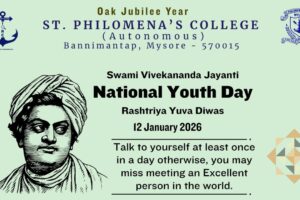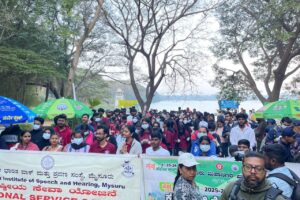
Report on the Rural and Tribal Study Camp
Report on the Rural and Tribal Study Camp
Venue: Padukote Kaval Panchayat, H.D. Kote Taluk, Mysuru
Duration: 12th May 2025 to 18th May 2025
The Department of Postgraduate Studies and Research in Social Work, St. Philomena’s College, organised a Rural and Tribal Study Camp from 12th to 18th May 2025 at Padukote Kaval Panchayat, H.D. Kote Taluk, Mysuru. The primary objective of the camp was to provide students with a first-hand understanding of rural and tribal life, enabling them to engage directly with communities and gain practical insights into grassroots-level social work.
The inaugural ceremony of the camp was held at the Shanthi Rural Development Centre, Padukote. The event witnessed the presence of several dignitaries, including Panchayat President Smt. Najamunisa, Panchayat Development Officer (PDO), Mr. Shivakumar, Panchayat Member, Smt. Leila, Coordinator of Shanthi Gramabhivruddhi Kendra, Sr. Appoline, Sr Jessy, Panchayat Engineer Mr. Nischith, and Camp Director Mr. Robin K.J. The villagers and first-year MSW students also actively participated in the programme.
The keynote address was delivered by Camp Director Mr. Robin K. J, who emphasised that the camp offers a significant opportunity for MSW students to immerse themselves in rural and tribal settings, fostering experiential learning. He highlighted the value of understanding community life by living among the people and learning from their lived experiences.
PDO Mr. Shivakumar addressed the gathering, underscoring the importance of practical education in social work. He encouraged the students to utilise the camp as a platform for applying theoretical knowledge in real-world contexts.
The presidential address was delivered by Sr Appoline, who warmly welcomed the MSW students to the village. She encouraged them to interact meaningfully with the community over the next seven days and to develop a spirit of service rooted in empathy and learning.
As part of the seven-day camp, a free medical check-up camp will be organised in collaboration with St. Joseph’s Hospital, Bannimantap. Additionally, the programme includes awareness sessions for villagers and students, jathas (rallies), and street plays focusing on various social issues.
The Master of Ceremonies for the inaugural programme was Sr Gloria. The event began with a prayer by Adithya, followed by a welcome speech delivered by Dileep. The vote of thanks was proposed by Netravathi, expressing gratitude to all dignitaries, participants, and supporting organisations for their contribution to the success of the inaugural event.
The camp promises to be a transformative experience for the students, offering them a deeper understanding of rural realities and the role of social work in community development.


Day 2 Report: Rural and Tribal Study Camp
The second day of the Rural and Tribal Study Camp commenced with a morning prayer followed by a yoga session, setting a reflective and energetic tone for the day. Subsequently, the MSW trainees organised a jatha (awareness rally), where they raised slogans and displayed placards emphasising the significance of education, environmental conservation, and health awareness.
Following the rally, all participants assembled in the community hall for an academic session on Participatory Rural Appraisal (PRA), led by Mr. Robin K. J., Assistant Professor and Camp Director. In his comprehensive session, Mr. Robin provided insights into the history and evolution of PRA and elaborated on various PRA tools and techniques such as village mapping, transect walks, seasonal calendars, timelines, Venn diagrams, ranking and scoring, and problem tree analysis. He also introduced the students to survey methodologies and distributed structured questionnaires to facilitate household-level data collection. Post-session, the trainees actively engaged with village families, conducting surveys to understand community needs and resources.
The afternoon session was facilitated by Sr. Appoline, Coordinator of Shanti Gramabivardhi Kendra, who delivered an enlightening lecture on “The Role of the Social Worker in the Community.” She emphasised the rights-based approach and explored key competencies of a professional social worker, including critical thinking, active listening, non-judgmental attitude, cultural sensitivity, empathy, and universal respect for human dignity. As a practical component, Sr. Appoline conducted a team-building activity involving the construction of a tower using straws, promoting collaboration and problem-solving among students.
The day concluded with a vibrant cultural program where MSW trainees performed a street play aimed at creating awareness on the issue of child marriage and promoting the Child Helpline 1098. The performances were well-received by the community and served as an effective medium for social messaging. The day ended with a reflective evaluation session, allowing students to share their experiences, learning outcomes, and areas for improvement.










Day 3 Report: Rural and Tribal Study Camp
Date: 14.05.2025
The third day of the Rural and Tribal Study Camp commenced with a morning prayer and exercise session to instil discipline and promote physical well-being among the participants. This was followed by a Shramadan activity, during which the students actively participated in community cleaning efforts. The areas covered included the central circle of the village and the premises in front of the Primary Health Centre, reflecting the students’ commitment to community hygiene and public health.
Post the Shramadan, the trainees resumed their household survey work, continuing to collect data from village families as part of the Participatory Rural Appraisal (PRA) exercise initiated earlier. This activity contributed to a deeper understanding of local socio-economic conditions and community needs.
In the afternoon, an informative session on the Gram Panchayat System was conducted by Mr. Venkatesh, Secretary of the Gram Panchayat. The resource person provided an in-depth explanation of the structure, roles, and functioning of the Gram Panchayat. He elaborated on various schemes and development programs implemented at the local governance level and highlighted the significance of Gram Sabha as a democratic platform for community participation and accountability.
Following the session, students began preparations for the evening cultural program intended to engage and educate the community. However, due to unfavourable weather conditions, the program was postponed to the following day.
The day concluded with an evaluation session, where students reflected on the day’s activities, shared feedback, and discussed their learnings, reinforcing the importance of field engagement in social work education.






Day 4 Report: Rural and Tribal Study Camp
Date: 15.05.2025
The fourth day of the Rural and Tribal Study Camp began with a morning exercise session followed by Shramadan (voluntary community work) around the premises of the Primary Health Centre (PHC) in Padukote. These activities fostered a sense of responsibility and cleanliness among the trainees and set the tone for a service-oriented day.
The day’s major initiative was the Free Medical Check-Up Camp, organised by the Department of Postgraduate Studies and Research in Social Work in collaboration with St. Joseph’s Hospital, Mysuru. The camp was held in two locations—Padukote village and Manti Haadi (a tribal settlement). The medical team included Dr. Seema, Nurses Jennifer and Priyanka, and Driver Krishna Raju. During the camp at Manti Haadi, the team identified prevalent health issues such as leprosy, physical disabilities, and parasitic infections among the tribal residents.
In the afternoon, the medical team extended their services at Shanti Gramabivrudhi Kendra, Padukote. Villagers actively participated, and over 50 individuals availed of the free health consultation services. Common health concerns reported included diabetes, joint pain, respiratory issues, and other age-related ailments.
In parallel, the MSW trainees organised a series of recreational games and fun activities for children from the Haadi. These activities aimed to promote social inclusion and provide psycho-social support. Prizes were distributed to encourage participation and joy among the children.
Later in the day, students attended an awareness session on “Vaccination for Children and Pregnant Women”, conducted by ASHA workers from the local Panchayat. The session highlighted the importance of immunisation in preventing disease and ensuring maternal and child health in rural areas.
The evening concluded with a cultural program, where MSW students performed a mime centred on the adverse effects of mobile phone addiction in contemporary society. The creative presentation aimed to sensitise the audience to the psychological and social consequences of excessive screen time.
The day ended with a reflection and evaluation session, where students discussed the impact of the medical camp, identified areas for improvement, and developed a plan of action for the following day.













Day 5 Report: Rural and Tribal Study Camp
Date: 16.05.2025
The fifth day of the Rural and Tribal Study Camp commenced with a morning exercise session, followed by a team-based activity designed to enhance leadership skills and group cohesiveness among the students. The activity encouraged collaboration, coordination, and reflective thinking—key competencies for professional social workers.
Subsequently, the students undertook Shramadan (voluntary labour) near the Anganwadi Centre of Padukote Panchayat, focusing on cleaning the surrounding areas. This initiative reinforced the value of community participation in maintaining hygiene and supporting public institutions.
The forenoon academic session featured an invited talk by Advocate Jayashankar from H.D. Kote, who brings over 17 years of legal experience. He delivered an engaging and insightful session on Child Rights, Protection of Women from Harassment, and the POCSO Act. Through real-life case examples, he illustrated the various challenges faced by women and children in rural settings. The session was highly interactive, with Advocate Jayashankar addressing students’ questions and providing legal clarity on sensitive issues.
In the afternoon, a Jatha (awareness rally) was organized on the themes of Women and Child Rights, involving enthusiastic participation from local villagers and Self Help Group (SHG) members of Shanti Gramabivrudhi Kendra, Padukote, under the guidance of Sr. Appoline, the Coordinator. The rally effectively disseminated messages about protection, rights, and empowerment through slogans and placards, creating awareness at the grassroots level.
Later in the evening, a cultural programme was held, featuring an awareness skit and interactive games for villagers. The performances were designed to entertain while simultaneously educating the community on pressing social issues related to women and children.
The day concluded with the daily evaluation session, where students shared reflections, provided peer feedback, and discussed the day’s successes and challenges. Planning was also undertaken for the next day’s children’s games and the valedictory ceremony, marking the closing of the camp.









Day 6 Report: Rural and Tribal Study Camp
Date: 17.05.2025
The sixth day of the Rural and Tribal Study Camp began with a morning exercise session, promoting physical well-being, discipline, and a sense of routine among the MSW students. This was followed by cleaning activities in the camp premises, which helped instil values of teamwork and responsibility. These initial tasks set a positive tone for the day’s learning and field-based activities.
The main focus of the day was the implementation of a Participatory Rural Appraisal (PRA) tool – Village Mapping. The site for this activity was selected near the village temple, providing visibility and accessibility for community members to engage. Students were divided into two groups, each responsible for different sections of the village layout. Through this exercise, students were able to understand the spatial distribution of the village’s physical and social resources, infrastructure, and significant landmarks. This hands-on activity fostered a deeper connection with the village and allowed students to apply participatory methodologies in real-time, strengthening their fieldwork skills.
At 10:00 AM, a guest lecture was delivered by Mrs. Ashwini, President of Sanjiveeni Okkuta. She spoke on the importance of Self-Help Groups (SHGs) in rural development and women’s empowerment. Her talk highlighted how SHGs have played a pivotal role in transforming the lives of rural women, enabling many to evolve from homemakers to entrepreneurs. She provided detailed insights into how Sanjiveeni Okkuta supports women in both domestic and economic spheres. Her session served as a powerful inspiration for students, emphasising the importance of grassroots institutions in promoting social change and empowerment. At the end of the session, a token of appreciation was presented to Mrs. Ashwini on behalf of the department, acknowledging her valuable contribution.
Following the guest session, students returned to complete the Village Mapping activity and began preparations for the camp’s valedictory function. The valedictory ceremony was held in the evening, presided over by Rev. Fr. Gnanan Pragasam. The event was graced by the presence of Fr. David Sagayaraj, Assistant to the Rector, along with Sr. Appoline, Coordinator of Shanthi Gramabivrudhi Kendra, Sr. Jessy, and Sr. Sherin. The dignitaries shared their encouraging feedback about the students’ involvement, discipline, and contributions during the camp and expressed their appreciation for the Department’s efforts in organising such a meaningful learning experience.
As part of the closing celebrations, prizes were distributed to the winners of various events conducted throughout the camp. The program was led by the students: Meljo served as the Master of Ceremonies, the opening prayer was led by Adithya, and the welcome address was delivered by Bincy. On behalf of the MSW student group, Sr. Gloria shared heartfelt reflections about their camp experience. The vote of thanks was delivered by Mr. Robin K. J., Camp Director, who acknowledged the support of all contributors and participants. The day concluded with all the dignitaries and MSW students visiting the Village Map site, symbolising the successful culmination of the day’s PRA activity and the collective efforts made throughout the camp.








Day 7 Report: Rural and Tribal Study Camp
Date: 18.05.2025
On the concluding day of the seven-day rural and tribal study camp, a heartfelt farewell gathering was organised to bid adieu to the MSW students who had actively participated in the camp’s various activities. The event saw the gracious presence of villagers, members of Self-Help Groups (SHGs), children from the locality, and respected dignitaries, including Sr. Appoline, Sr. Jessy, and Sr. Sherine.
The gathering was marked by warm interactions, expressions of gratitude, and emotional farewells. The villagers and SHG members extended their sincere appreciation to the students for their dedicated efforts and meaningful contributions throughout the camp. The children, who had grown fond of the students during the week, also joined in to share their goodbyes.
The dignitaries congratulated the students for their active involvement, commitment, and community engagement during their stay. They also offered their blessings and conveyed best wishes for the students’ future academic and professional endeavours. The farewell ceremony served as a touching conclusion to a week of learning, service, and mutual growth, leaving behind lasting memories for both the students and the community members.



